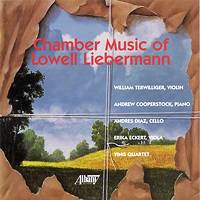
Strongly neo-romantic
Chamber music by
Lowell Liebermann -
reviewed by
CARSON COOMAN'The playing is uniformly committed.'
|

|
This disc is the first release devoted entirely to the string chamber music of American composer Lowell Liebermann (born 1961). Educated at the Juilliard School and having spent his entire life in New York City, Liebermann has been an active and prolific composer of music primarily for orchestral and chamber forces. He is also an exceptional pianist and has been active as festival director and conductor in the past.
The Terwilliger-Cooperstock Duo (violin and piano) provide the core of this CD's performers, which include other guest string musicians, including the renowned cellist Andres Diaz and the exceptional Ying Quartet. The playing is uniformly committed.
In recent years, Liebermann's work has gained a great deal of notoriety -- particularly his orchestral music. Through his ongoing position as composer-in-residence for the Dallas Symphony, he has created many works which have been played by numerous orchestras around the world. The notoriety surrounding Liebermann's music comes from the highly conservative nature of his mature style -- dubbed strongly neo-Romantic by most. Starting with a series of early works, in which a post-romantic tonality almost sought to break out of an acerbic palate, Liebermann then let that tonality burst forth in a full-blown neo-Romantic language in the early 1990s, gaining much visibility with his Concerto No 2 for Piano and Orchestra which is still frequently played -- a work whose surface harmonic and gestural language resembles an ultra-Rachmaninov.
Getting beyond questions of style, Liebermann is a strong craftsman and a fluent instrumental writer. All of his music is gratifying to listen to and gratifying to play (even when it is difficult). For those who are looking for enjoyable contemporary music in a conservative vein, Liebermann is just the person. For those who are seeking new adventures and sounds, his stylistic palate may seem at best dated, and at worst banal. For those who listen to a great deal of Liebermann's music another issue that can arise is a large harmonic sameness from work to work. Certain characteristic chord progressions and figurations return in nearly every Liebermann piece and though they are effective, one wishes for more variety at times.
Unlike many contemporary composers (and like very many 18th and 19th century composers), Liebermann's music is almost never programmatic and, works are nearly always given simple titles based on their instrumentation or form. This is music concerned only with its own musical material.
Continue >>
Copyright © 19 January 2005
Carson P Cooman, Rochester, NY, USA

|

